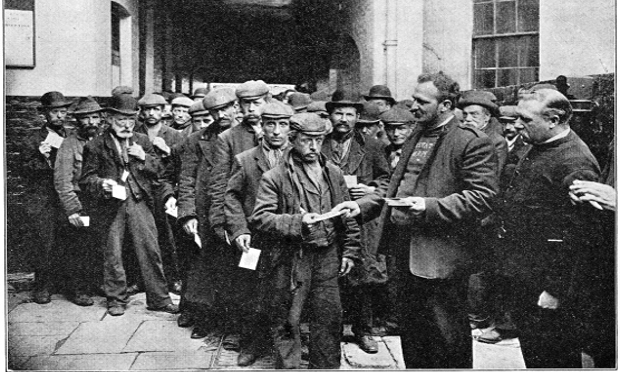
“For the English, so far as manhood and womanhood and health and happiness go, I see a broad and smiling future. But for a great deal of the political machinery, which at present mismanages for them, I see nothing else than the scrap heap.”
Roughly 30 years before Victor Gallancz published the fruits of George Orwell’s destitute adventures either side of the English Channel, Jack London’s unflinching portrayal of The People of the Abyss (1903) first came to print. Well over a century on and his taut account of tramping the then disgracefully poor avenues of the East End has been rereleased by Tangerine Press and comes with an extraordinary stock of the author’s original photographic plates.
Evocative of Jacob Riis’s seminal work on How the Other Half Lives, London’s socialist expose is red raw and scathing of the powers that be. Slipping beneath the pomp of the British Empire at its opulent peak, the San Francisco native – who would later pen White Fang and The Call of the Wild – traded his wealth and comfort for a suit of secondhand rags, sinking willingly into what he presents as a festering pit of despair and degradation.
“We rolled along through miles of bricks and squalor, and from each cross street and alley flashed long vistas of bricks and misery,” he writes early on. “Here and there lurched a drunken man or woman, and the air was obscene with sounds of jangling and squabbling.” It’s an ugly picture that grows and darkens with each engrossing chapter.
The text works something like a montage, with London’s short but weighty anecdotes delivered in desperately passionate prose. We join him as he wanders the streets and dosshouses with cheerless companions, scoffing foul hospital leftovers and sipping pints of ‘skilly’ – a coarse “fluid concoction of three quarts of oatmeal stirred into three buckets and a half of hot water”.
The material is uncomfortably harsh and offers a brutal dissection of early 20th-century morality and law. “Here then we have the construction of the Abyss and the shambles,” the author explains. “Throughout the whole industrial fabric a constant elimination is going on. The inefficient are weeded out and flung downward.” He proceeds to detail various circumstances that might make an unfortunate person “inefficient”, thus becoming a part of his wretched statistic that one in every three working adults would die on public charity.
London also attacks the absurdity of policemen who would forcibly prevent the homeless from sleeping at night – preferring them to wander like zombies in the moonlight – and details the hopelessness of the old whose children were either dead or otherwise unable to support them. It’s stirring stuff, to say the least.
It’s hard, though, not to suspect the author of exaggeration. But, as Iain Sinclair’s measured and typically insightful introduction supports, this is not necessarily a fair criticism: “The People of the Abyss is intentionally shocking,” Sinclair writes. “Much of Jack London’s material, factored like sensational fiction, is supported by blocks of statistics, newspaper cuttings, court reports.”
He goes on to crack the nail on the head, asserting that “reality is pressured until it becomes fantastic, grotesque.”
Grotesque is absolutely right. London’s work as a faux-displaced sailor brings to light a distorted world of hellish poverty. While occasional splashes of humour might today be perceived as facetious, his unwavering dedication to raising awareness of the plight of what was a rotten East End is most impressive.
His icy images, savagely oppressed characters – like the unforgettable Dan Cullen the Docker – and unrelenting energy make for an enriching, if bruising, read with a relevance by no means confined to its own time.
The People of the Abyss is published by Tangerine Press. RRP: £10. ISBN: 9780957338531
Leave a Reply